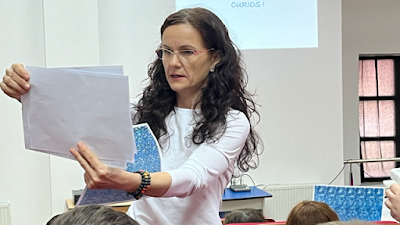Peloponnese, Antigone, and Democratic Values
Theater is a perfect educational tool for shaping our students because it engagingly fosters communication skills while also developing many essential abilities such as coordination, teamwork, and emotional intelligence. For this reason, the group of teachers from Greece has wisely chosen to use the rich theatrical heritage of Classical Greece. In this context, Sophocles offers invaluable material to convey lessons closely aligned with the goals of our Erasmus+ project, “The New Values of Democracy in Today’s Europe.”
The only workshop of the day featured the performance of a fragment from Antigone, the Theban tragedy in which the daughter of King Oedipus and Jocasta confronts the current king of Thebes, Creon. While Creon defends his political decisions, Antigone fights for her family and her duty to the gods, declaring, “I was not born to hate but to love.”
The students put into practice the thorough rehearsal conducted at school last Monday. The chorus of the Greek tragedy served as the voice of the people’s conscience, influencing Creon’s decisions. Organized by country, the students repeated the protagonist’s message in the different languages of the nations participating in our project: Romanian, Spanish, Polish, Croatian, Greek, and Portuguese.
With such a high-quality text, the performance was nothing short of spectacular. All project participants traveled by bus to the Sanctuary of Asklepios, a UNESCO World Heritage Site, where the Theater of Epidaurus is located. In this theater, built in the 4th century BCE, the students occupied the circular space of the orchestra to perform the excerpt from Antigone. The audience thoroughly enjoyed the performance, and through the cathartic effect, we empathized deeply with the feelings and desires of the Theban heroine.
The Erasmus project expedition made a stop halfway at the Corinth Canal, an impressive feat of engineering that cuts through the Isthmus of the Peloponnese to facilitate the passage of ships between the Gulf of Corinth in the north and the Saronic Gulf in the southeast. Later, we traveled through the Argolis region to its capital, Nafplio. There, we had lunch and took a stroll through the center of the coastal city. In the afternoon, we returned to Petroupoli with the pleasant aftertaste left by our experience at the Theater of Epidaurus.








Comments
Post a Comment